最新PEP小学英语语法要点及练习题资料整理资料
人教版PEP小学英语语法要点及习题
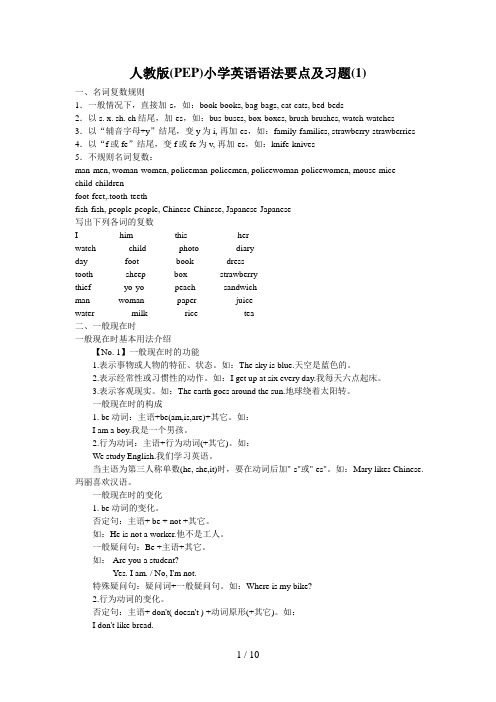
人教版(PEP)小学英语语法要点及习题(1)一、名词复数规则1.一般情况下,直接加-s,如:book-books, bag-bags, cat-cats, bed-beds2.以s. x. sh. ch结尾,加-es,如:bus-buses, box-boxes, brush-brushes, watch-watches3.以“辅音字母+y”结尾,变y为i, 再加-es,如:family-families, strawberry-strawberries 4.以“f或fe”结尾,变f或fe为v, 再加-es,如:knife-knives5.不规则名词复数:man-men, woman-women, policeman-policemen, policewoman-policewomen, mouse-micechild-childrenfoot-feet,.tooth-teethfish-fish, people-people, Chinese-Chinese, Japanese-Japanese写出下列各词的复数I _________him _________this ___________her ______watch _______child _______photo ________diary ______day________ foot________ book_______ dress ________tooth_______ sheep ______box_______ strawberry _____thief _______yo-yo ______ peach______ sandwich ______man______ woman_______ paper_______ juice___________water________ milk________ rice__________ tea__________二、一般现在时一般现在时基本用法介绍【No. 1】一般现在时的功能1.表示事物或人物的特征、状态。
人教版PEP小学英语语法要点及习题

人教版(PEP)小学英语语法要点及习题(1)一、名词复数规则1.一般情况下,直接加-s,如:book-books, bag-bags, cat-cats, bed-beds2.以s. x. sh. ch结尾,加-es,如:bus-buses, box-boxes, brush-brushes, watch-watches 3.以“辅音字母+y”结尾,变y为i, 再加-es,如:family-families, strawberry-strawberries 4.以“f或fe”结尾,变f或fe为v, 再加-es,如:knife-knives5.不规则名词复数:man-men, woman-women, policeman-policemen, policewoman-policewomen, mouse-micechild-childrenfoot-feet,.tooth-teethfish-fish, people-people, Chinese-Chinese, Japanese-Japanese写出下列各词的复数I _________him _________this ___________her ______watch _______child _______photo ________diary ______day________ foot________ book_______ dress ________tooth_______ sheep ______box_______ strawberry _____thief _______yo-yo ______ peach______ sandwich ______man______ woman_______ paper_______ juice___________water________ milk________ rice__________ tea__________二、一般现在时一般现在时基本用法介绍【No. 1】一般现在时的功能1.表示事物或人物的特征、状态。
人教版PEP小学英语语法精讲要点及习题
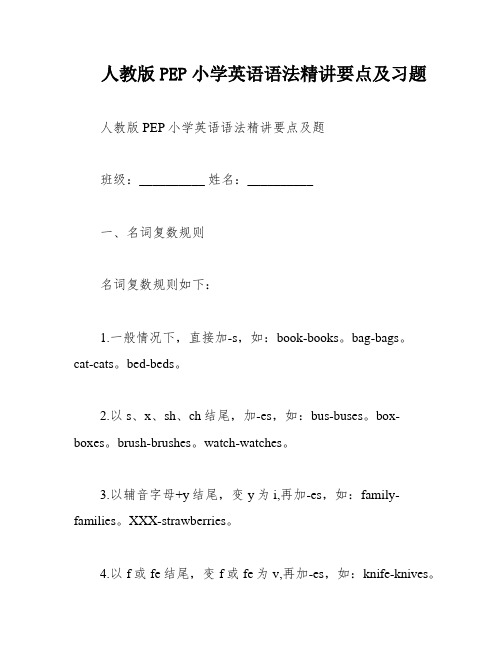
人教版PEP小学英语语法精讲要点及习题人教版PEP小学英语语法精讲要点及题班级:__________ 姓名:__________一、名词复数规则名词复数规则如下:1.一般情况下,直接加-s,如:book-books。
bag-bags。
cat-cats。
bed-beds。
2.以s、x、sh、ch结尾,加-es,如:bus-buses。
box-boxes。
brush-brushes。
watch-watches。
3.以辅音字母+y结尾,变y为i,再加-es,如:family-families。
XXX-strawberries。
4.以f或fe结尾,变f或fe为v,再加-es,如:knife-knives。
5.不规则名词复数:man-men。
woman-women。
policeman-policemen。
policewoman-policewomen。
mouse-mice。
child-children。
foot-feet。
tooth-teeth。
fish-fish。
people-people。
Chinese-Chinese。
Japanese-Japanese。
练:写出下列各词的复数I books him men this these her XXX二、一般现在时一般现在时基本用法介绍No。
1】一般现在时的功能1.表示事物或人物的特征、状态。
如:The sky is blue.天空是蓝色的。
2.表示经常性或惯性的动作。
如:I get up at six every day.我每天六点起床。
Drink plenty of water every day to keep yourself XXX for a walk in the morning is a great way to start your day。
Staying active XXX。
Looking after your mental health is just as important as your physical health。
人教版(PEP)小学英语语法要点及习题

人教版(PEP)小学英语语法要点及习题(1)一、名词复数规则1.一般情况下,直接加—s,如:book-books, bag—bags,cat—cats,bed—beds2.以s。
x. sh. ch结尾,加—es,如:bus-buses,box-boxes, brush-brushes, watch—watches 3.以“辅音字母+y”结尾,变y为i,再加—es,如:family—families, strawberry—strawberries 4.以“f或fe"结尾,变f或fe为v,再加-es,如:knife—knives5.不规则名词复数:man-men,woman—women,policeman-policemen, policewoman-policewomen, mouse—mice child—childrenfoot-feet,。
tooth-teethfish-fish, people-people,Chinese-Chinese, Japanese—Japanese写出下列各词的复数I _________him _________this ___________her ______watch _______child _______photo ________diary ______day________ foot________ book_______ dress ________tooth_______ sheep ______box_______ strawberry _____thief _______yo—yo ______ peach______ sandwich ______man______ woman_______ paper_______ juice___________water________ milk________ rice__________ tea__________二、一般现在时一般现在时基本用法介绍【No. 1】一般现在时的功能1.表示事物或人物的特征、状态.如:The sky is blue。
PEP小学英语语法大全及复习习题(16页)

时间名词前所用介词的速记歌年月周前要用in,日子前面却不行。
遇到几号要用on,上午下午又是in。
要说某日上下午,用on换in才能行。
午夜黄昏须用at,黎明用它也不错。
at也用在明分前,说“差”可要用上to,说“过”只可使用past,多说多练牢牢记,莫让岁月空蹉跎。
下面就时间概念的介词用法做一简要介绍和比较。
1.at表示时间概念的某一个点。
(在某时刻、时间、阶段等)。
at 1:00(dawn,midnight,noon)在一点钟(黎明、午夜、中午)these are our chief tasks at the present stage.这些就是我们现阶段的主要任务。
2.on1)表示具体日期。
they arrived in shanghai on may25.他们在五月二十五日到达上海。
注:(1)关于"在周末"的几种表示法:at(on)the weekend在周末---特指at(on)weekends在周末---泛指over the weekend在整个周末during the weekend在周末期间(2)在圣诞节,应说"at Christmas而不说"on Christmas2)在(刚……)的时候。
on reaching the city he called up his parents.一到城里他就给父母打了一个电话。
3.in1)表示"时段"、"时期",在多数情况下可以和dur- ing互换,前者强调对比,后者强调持续。
in(during)1988(December,the 20th century)在一九八八年(十二月、二十世纪)i returned to Beijing in the middle of June.我是六月中回北京的。
但如果表示"在某项活动的期间",则只能用during。
人教版(PEP)小学英语语法要点及习题
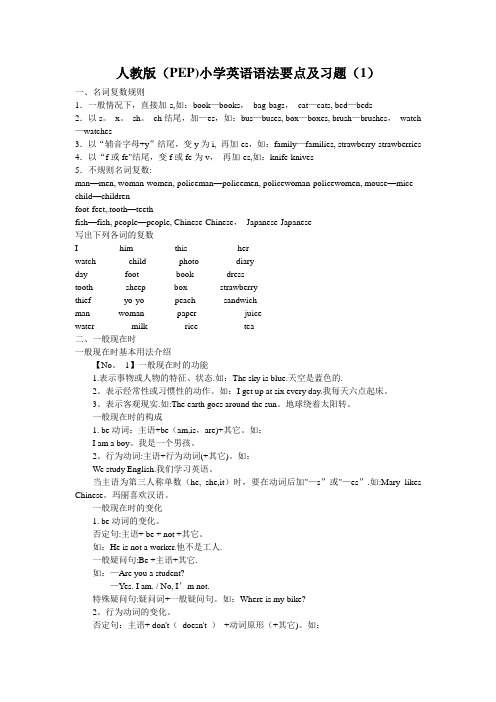
人教版(PEP)小学英语语法要点及习题(1)一、名词复数规则1.一般情况下,直接加-s,如:book—books,bag-bags,cat—cats, bed—beds2.以s。
x。
sh。
ch结尾,加—es,如:bus—buses, box—boxes, brush—brushes,watch —watches3.以“辅音字母+y”结尾,变y为i, 再加-es,如:family—families, strawberry-strawberries 4.以“f或fe"结尾,变f或fe为v,再加-es,如:knife-knives5.不规则名词复数:man—men, woman-women, policeman—policemen, policewoman-policewomen, mouse—mice child—childrenfoot-feet,.tooth—teethfish—fish, people—people, Chinese-Chinese,Japanese-Japanese写出下列各词的复数I _________him _________this ___________her ______watch _______child _______photo ________diary ______day________ foot________ book_______ dress ________tooth_______ sheep ______box_______ strawberry _____thief _______yo-yo ______ peach______ sandwich ______man______ woman_______ paper_______ juice___________water________ milk________ rice__________ tea__________二、一般现在时一般现在时基本用法介绍【No。
PEP新版小学英语总复习资料(精华版)
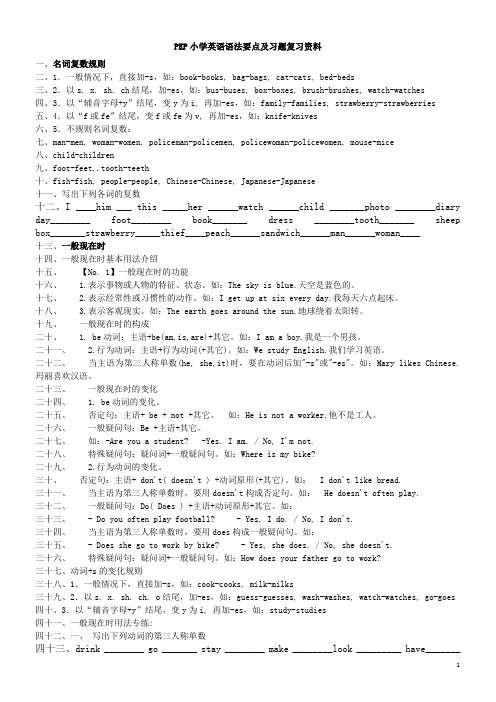
PEP小学英语语法要点及习题复习资料一、名词复数规则二、1.一般情况下,直接加-s,如:book-books, bag-bags, cat-cats, bed-beds三、2.以s. x. sh. ch结尾,加-es,如:bus-buses, box-boxes, brush-brushes, watch-watches四、3.以“辅音字母+y”结尾,变y为i, 再加-es,如:family-families, strawberry-strawberries五、4.以“f或fe”结尾,变f或fe为v, 再加-es,如:knife-knives六、5.不规则名词复数:七、man-men, woman-women, policeman-policemen, policewoman-policewomen, mouse-mice八、child-children九、foot-feet,.tooth-teeth十、fish-fish, people-people, Chinese-Chinese, Japanese-Japanese十一、写出下列各词的复数十二、I ____him ___ this _____her ______watch ______child _______photo ________diary day________ foot________ book_______ dress ________tooth_______ sheep box_______strawberry_____thief____peach______sandwich______man______woman____十三、一般现在时十四、一般现在时基本用法介绍十五、【No. 1】一般现在时的功能十六、 1.表示事物或人物的特征、状态。
如:The sky is blue.天空是蓝色的。
十七、 2.表示经常性或习惯性的动作。
小学英语(人教版PEP版)语法要点详解及练习题-六年级-小升初必备大全
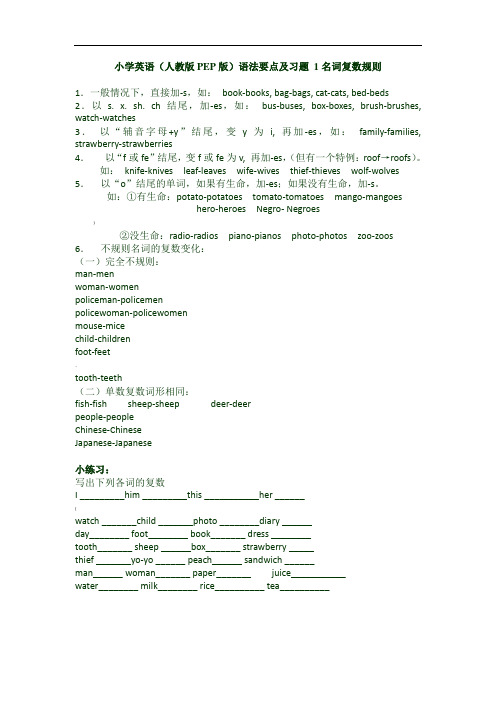
小学英语(人教版PEP版)语法要点及习题1名词复数规则1.一般情况下,直接加-s,如:book-books, bag-bags, cat-cats, bed-beds2.以s. x. sh. ch结尾,加-es,如:bus-buses, box-boxes, brush-brushes, watch-watches3.以“辅音字母+y”结尾,变y为i, 再加-es,如:family-families, strawberry-strawberries4.以“f或fe”结尾,变f或fe为v, 再加-es,(但有一个特例:roof→roofs)。
如:knife-knives leaf-leaves wife-wives thief-thieves wolf-wolves 5.以“o”结尾的单词,如果有生命,加-es;如果没有生命,加-s。
如:①有生命:potato-potatoes tomato-tomatoes mango-mangoeshero-heroes Negro- Negroes)②没生命:radio-radios piano-pianos photo-photos zoo-zoos6.不规则名词的复数变化:(一)完全不规则:man-menwoman-womenpoliceman-policemenpolicewoman-policewomenmouse-micechild-childrenfoot-feet、tooth-teeth(二)单数复数词形相同:fish-fish sheep-sheep deer-deerpeople-peopleChinese-ChineseJapanese-Japanese小练习:写出下列各词的复数I _________him _________this ___________her ______{watch _______child _______photo ________diary ______day________ foot________ book_______ dress ________tooth_______ sheep ______box_______ strawberry _____thief _______yo-yo ______ peach______ sandwich ______man______ woman_______ paper_______ juice___________water________ milk________ rice__________ tea__________小学英语(PEP版)语法总结及习题2一般现在时(一般现在时基本用法介绍【No. 1】一般现在时的功能1.表示事物或人物的特征、状态。
小学英语(人教版PEP)

---------------------------------------------------------------最新资料推荐------------------------------------------------------小学英语(人教版PEP)小学英语(人教版 PEP)语法要点及习题 1 名词复数规则 1、一般情况下,直接加-s,如:book-books,bag-bags,cat-cats,bed-deds 2、以 s,x,ch 结尾,加-es, 如:bus-buses,box-boxes,bruch-bruches,watch-watches 3、以辅音字母+y结尾,变 y 为 I,再加-es,如:family-families, strawberry-strawberries 4、以f 或 fe结尾,变 f 或 fe 为 v,再加-es,(但有一个特例:roof-roofs)。
小学英语(人教版 PEP)语法要点及习题 1 名词复数规则 1、一般情况下,直接加-s,如:book-books,bag-bags,cat-cats,bed-deds 2、以 s,x,ch 结尾,加-es, 如:bus-buses,box-boxes,bruch-bruches,watch-watches 3、以辅音字母+y结尾,变 y 为 I,再加-es,如:family-families, strawberry-strawberries 4、以f 或 fe结尾,变 f 或 fe 为 v,再加-es,(但有一个特例:roof-roofs)。
如:knife-knives leaf-leaves wife-wives thief-thieves1/ 29wolf-wolves 5、以o结尾的单词,如果有生命,加-es;如果没有生命,加-s。
如:1 有生命:potato- potatoes tomato- tomatoes mango-mangoeshero-heroes Negro-Negroes 2 没有生命:radio-radioes piano-pianos photo-photos zoo-zoos 5、以o结尾的单词,如果有生命,加-es;如果没有生命,加-s。
人教版(PEP)小学英语语法要点及习题

回答)_________________________________
_________________________________
3.I’m playing the football in the playground对.(划线部分进行提问)
He doesn't often play.
一般疑问句:
3/22
Do( Does ) +主语+动词原形+其它。如:
-Do you often play football?
-Yes, I do. / No, I don't.
当主语为第三人称单数时,要用does构成一般疑问句。如:
-Does she go to work by bike?
3.表示客观现实。如:
The earth goes around the sun地.球绕着太阳转。
一般现在时的构成
1.be动词:
主语+be(am,is,are)+其它。如:
I am a boy.我是一个男孩。
2.行为动词:
主语+行为动词(+其它)。如:
We study English我.们学习英语。
人教版(PEP)小学英语语法要点及习题
(1)
一、名词复数规则
1.一般情况下,直接加-s,如:
book-books, bag-bags, cat-cats, bed-beds
2.以s. x. sh. ch结尾,加-es,如:
bus-buses, box-boxes, brush-brushes, watch-watches
- 1、下载文档前请自行甄别文档内容的完整性,平台不提供额外的编辑、内容补充、找答案等附加服务。
- 2、"仅部分预览"的文档,不可在线预览部分如存在完整性等问题,可反馈申请退款(可完整预览的文档不适用该条件!)。
- 3、如文档侵犯您的权益,请联系客服反馈,我们会尽快为您处理(人工客服工作时间:9:00-18:30)。
精品文档PEP小学英语语法要点及练习题资料整理一、名词复数规则1.一般情况下,直接加-s,如:book-books, bag-bags, cat-cats, bed-beds2.以s. x. sh. ch 结尾,加-es, 如:bus-buses, box-boxes, brush-brushes, watch-watches3.以“辅音字母+y” 结尾,变y 为i,再加-es,如:family-families, strawberry-strawberries4.以“f或fe”结尾,变f或fe为v,再加-es,如:knife-knives5.不规则名词复数:man-men, woman-women, policeman-policemen, policewoman-policewomen, mouse-mice child-children foot-feet,.tooth-teethfish-fish, people-people, Chinese-Chinese, Japanese-Japanese写出下列各词的复数I him this ___ her _____watch child photo ___ diary _____day ____ foot ______ _ book ___ __ dress ______tooth _ _____ sheep_______box _____ _ strawberry ___thief yo-yo peach sandwichman_ __ woman ____ __ paper __ juice water milk ___ rice __ tea二、一般现在时.写出下列」动词的第三人称单数drink go _ stay ____ __ make ______ look _ ______ have ____ ___ pass ___ ___ carry ____come _ _____ watch_ plant flystudy _ brush ___ do ___ teach二、用括号内动词的适当形式填空。
1. He often(have) dinner at home.2. Daniel and Tommy(be) in Class One.3. We ______ (not watch) TV on Monday.4.Nick ______5. ____ they _(not go) to the zoo on Sunday. _______ (like) the World Cup?6. What _____ _they often ______ (do) on Saturdays?7. _______ y our parents _______ (read) newspapers every day?8. The girl ___ __ (teach) us English on Sundays.9. She and I __ _____ (take) a walk together every evening.10. There ___ ___ (be) some water in the bottle.11. Mike ____ _(like) cooking.12. They ____ _(have) the same hobby.13. My aunt _ ____ (look) after her baby carefully.14. You always ______ (do) your homework well.15. I ______ (be) ill. I'm staying in bed.16. She _____ _(go) to school from Monday to Friday.精品文档精品文档17.Liu Tao(do) not like PE.18.The child often(watch) TV in the evening.19.Su Hai and Su Yang(have) eight lessons this term.20.—What day(be) it today?—It’ s Saturday m、按照要求改写句子1.Daniel watches TV every evening.(改为否定句)2.I do my homework every day.改为一般疑问句,作否定回答)3.She likes milk.(改为一般疑问句,作肯定回答)4.Amy likes playing computer games.(改为一般疑问句,作否定回答)5.We go to school every morning.(改为否定句)6.He speaks English very well.(改为否定句)7.I like taking photos in the park.(对划线部分提问)8.John comes from Canada.(对划线部分提问)9.She is always a good student.(改为一般疑问句,作否定回答)10.Simon and Daniel like going skating.(改为否定句)五、改错(划出错误的地方,将正确的写在横线上)1.Is your brother speak English?2.Does he likes going fishing?3.He likes play games after class.4.Mr. Wu teachs us English.5.She don't do her homework on Sundays.三、现在进行时动词加ing的变化规则1.一般情况下,直接加ing,如:cook-cooking2.以不发音的e 结尾,去e 力口ing, 如:make-making, taste-tasting3.如果末尾是一个元音字母和一个辅音字母,双写末尾的辅音字母,再加ing,如:run-running, stop-stopping 现在进行时专项练习:一、写出下列动词的现在分词:play run swim makego like write skiread have sing danceput see buy lovelive take come getstop ___ ____ sit____ ___ b egin_____ shop__二、用所给的动词的正确形式填空:精品文档精品文档1.The boy( draw)a picture now.2. Listen .Some girls( sing)in the classroom .3. My mother( cook )some nice food now.4. What you( do ) now?5. Look . They( have) an English lesson .6.They(not ,water) the flowers now.7.Look! the girls(dance )in the classroom .8.What is our granddaughter doing? She(listen ) to music.9. It’s 5 o,clock now. We(have)supper now10.Helen(wash )clothes? Yes ,she is .三、句型转换:1.They are doing housework .(分别改成一般疑问句和否定句)2.The students are cleaning the classroom .(改一般疑问句并作肯定和否定回答)3.I’ m playing the football in the playground .时划线部分进行提问)4.Tom is reading books in his study .对划线部分进行提问)四、将来时理论及练习填空。
1.我打算明天和朋友去野炊。
I have a picnic with my friends.I have a picnic with my friends.2.下个星期一你打算去干嘛?我想去打篮球。
What _______________________________________________ n ext Monday? Iplay basketball. What you do next Monday? I play basketball.3.你妈妈这个周末去购物吗?是,她要去买一些水果。
your mother go shopping this?Yes, she. She buy some fruit.4. 你们打算什么时候见面。
What time you meet?改句子。
5. Nancy is going to go camping.(改否定) Nancy going to go camping.6.I’ ll go and join them.(改否定)I go join them.7.I’ m going to get up at 6:30 tomorrow.(改一般疑问句) to get up at 6:30 tomorrow?8.We will meet at the bus stop at 10:30.(改一般疑问句) meet at the bus stop at 10:30.9.She is going to listen to music after school.(对划线部分提问) 精品文档精品文档she after school?10.My father and mother are going to see a play the day after tomorrow.同上) going to see a play the day after tomorrow. 用所给词的适当形式填空。
11.Today is a sunny day. We(have) a picnic this afternoon.12.My brother(go) to Shanghai next week.13. Tom often(go) to school on foot. But today is rain. He(go) to school by bike.14. What do you usually do at weekends? I usually(watch) TV and(catch) insects?15. It,s Friday today. What she (do) this weekend? She (watch) TV and____________ (catch) insects.16. What(d0) you do last Sunday? I(pick) apples on a farm. What(do) next Sunday? I(milk) cows.17. Mary(visit) her grandparents tomorrow.18. Liu Tao(fly) kites in the playground yesterday.19. David(give) a puppet show next Monday.20. I(plan) for my study now五、一般过去时am,is-was, are-were, do-did, see-saw, say-said, give-gave, get-got, go-went, come-came, have-had, eat-ate, take-took, run-ran, sing-sang, put-put, make-made, read-read, write-wrote, draw-drew, drink-drank, fly-flew, ride-rode, speak-spoke, sweep-swept, swim-swam, sit-sat过去时练习写出下列动词的过去式is\amfly plant are drinkplay go make doesdance worry ask tasteeat draw put throw kick pass doBe 动词的过去时练习(1)Name No.Date一、 用be 动词的适当形式填空1. I _______ at school just now.6. There ___ ___ an apple on the plate yesterday. 2. He _____ __ a t the camp last week.7. There ___ ___ some milk in the fridge on Sunday. 3. We ____ 4. They ___ 5. Yang Ling __ students two years ago.___ on the farm a moment ago._______ eleven years old last year. 8. The mobile phone _______ on the sofa yesterday evening.二、句型转换1. It was exciting. 否定句: ______________________________________________一般疑问句: __________________________________________肯、否定回答: ________________________________________2. All the students were very excited.否定句: ______________________________________________一般疑问句: __________________________________________ 精品文档肯、否定回答: ________________________________________3. They were in his pocket.否定句: ______________________________________________一般疑问句: __________________________________________肯、否定回答: ________________________________________Be 动词的过去时练习(2)Name No.Date一、用be 动词的适当形式填空1. I an English teacher now.2. She happy yesterday.3. They glad to see each other last month.4. Helen and Nancy good friends.5. The little dog two years old this year.6. Look, there lots of grapes here.7. There a sign on the chair on Monday..8. Today the second of June. Yesterday the first of June. It Children's Day. All the very excited.二、句型转换1. There was a car in front of the house just now.否定句: ______________________________________________一般疑问句: __________________________________________肯、否定回答: ________________________________________肯、否定回答: ________________________________________三、中译英1 .我的故事书刚才还在手表旁边。
